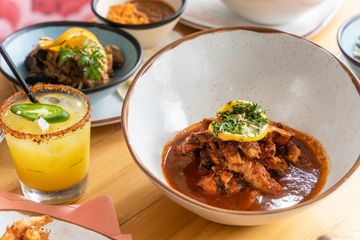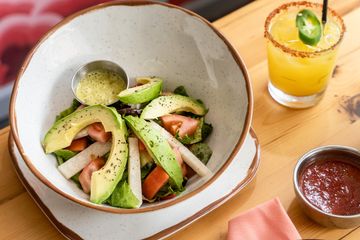Is Mexican Food Healthy? Unboxing the Nutritional Conveniences of Standard Components
The question of whether Mexican food is healthy and balanced invites an exploration of its conventional components. Beans and corn serve as foundational staples, abundant in healthy protein and fiber. Avocados supply valuable fats, while numerous natural herbs and seasonings include flavor and health and wellness benefits - New York Times rated. Together, these components develop a tapestry of nutrition. Nevertheless, the healthiness of Mexican food commonly depends upon prep work techniques and section dimensions. What duty do these elements play in determining its total nutritional value?
The Power of Beans: Healthy Protein and Fiber-Rich Staples
Often ignored, beans offer as a cornerstone of Mexican cuisine, using a wealth of nutritional advantages. Rich in protein, they are an exceptional plant-based alternative for those seeking to satisfy their dietary protein needs. This high protein content supports muscle mass repair and growth, making beans important for both meat-eaters and vegetarians alike. Additionally, beans are an exceptional source of dietary fiber, which helps in food digestion and advertises a sensation of volume, possibly aiding with weight management.
The variety of beans utilized in Mexican recipes, such as black beans, pinto beans, and kidney beans, adds to a diverse taste profile and can improve meals nutritionally. Beans are reduced in fat and have crucial vitamins and minerals, consisting of folate, iron, and magnesium. With each other, these features make beans a crucial ingredient, supplying both nourishment and sustenance in traditional Mexican price.

Corn: a Versatile Grain With Nutritional Benefits
Corn attracts attention as a flexible grain basic to Mexican cuisine, celebrated not only for its cooking applications yet also for its impressive dietary profile. As a key ingredient in recipes like tortillas, tamales, and pozole, corn offers essential nutrients that add to a balanced diet. Rich in carbohydrates, it works as a substantial energy source, while likewise being low in fat, making it a desirable choice for different dietary requirements.
Additionally, corn is a great source of nutritional fiber, which assists in food digestion and advertises satiety. It has considerable amounts of vitamins such as B-complex vitamins, which are essential for power metabolic process. The presence of anti-oxidants, particularly carotenoids, adds to general wellness by reducing oxidative anxiety. Additionally, corn is gluten-free, catering to those with gluten sensitivities. Generally, the dietary advantages of corn emphasize its importance in conventional Mexican food and its function in a healthy diet plan.
Avocados: Healthy And Balanced Fats and Nutrients in Every Bite
Avocados play a substantial duty in Mexican food, enhancing recipes with their creamy texture and rich flavor. Beyond their culinary charm, avocados are celebrated for their excellent nutritional profile. They are a rich source of healthy monounsaturated fats, which can assist reduced negative cholesterol levels and assistance heart wellness. Additionally, avocados are packed with important nutrients, consisting of potassium, vitamin E, and B vitamins, adding to general wellness.
The high fiber content in avocados help food digestion and advertises satiety, making them a helpful enhancement to any type of meal. Their distinct nutrient composition can also support skin health and provide anti-inflammatory advantages. Including avocados into conventional Mexican dishes or enjoying them as a standalone treat can improve both flavor and nutrition, demonstrating why they are a click cherished staple in Mexican cuisine. Overall, avocados use a scrumptious way to delight in healthy and balanced fats and critical nutrients in every bite.

Natural Herbs and seasonings: Flavorful Health Boosters
While enjoying the abundant tastes of Mexican food, one can not ignore the vital role that spices and herbs play in boosting both taste and wellness. Components such as cilantro, oregano, and chili peppers not only contribute to the vibrant taste profile yet also offer substantial health advantages. For instance, cilantro is recognized for its detoxifying residential or commercial properties, assisting to remove heavy metals from the body, while oregano is loaded with antioxidants and possesses anti-inflammatory results.
Chili peppers, a staple in numerous Mexican meals, include capsaicin, which has been connected to enhanced metabolic rate and discomfort alleviation. In addition, seasonings like cumin and coriander assistance digestion and may aid in blood sugar guideline. Incorporating these tasty health and wellness boosters into dishes not only improves the cooking experience but additionally advertises total wellness, making Mexican food not simply delicious, however also nutritionally useful.
Traditional Food Preparation Techniques: Enhancing Nourishment and Flavor
Traditional cooking techniques in Mexican food play an important duty in enhancing both nutrition and flavor, as they commonly focus on fresh components and time-honored methods. Strategies such as nixtamalization, where corn is saturated and cooked in an alkaline service, not only boost the nutrient account of tortillas however also boost their digestibility - hand crafted margarita. Additionally, the usage of sluggish cooking approaches, like stewing or braising, allows tastes to combine magnificently while keeping the integrity of the ingredients
Regularly Asked Concerns
Are Mexican Food Portions Normally Larger Than Various Other Cuisines?
Mexican food portions are often bigger than those of several various other cuisines. This characteristic mirrors typical eating methods, emphasizing public sharing and hearty meals, which can cause a more substantial offering dimension overall.
How Does the Prep Work Technique Affect Healthiness of Mexican Food?
Prep work techniques significantly affect the healthfulness of Mexican food. Techniques such as cooking or steaming protect nutrients, while frying can increase harmful fat material. Selections of components and cooking styles inevitably identify total dietary value.
Can Mexican Food Be Customized for Particular Nutritional Limitations?
Mexican food can indeed be customized for specific nutritional restrictions. Substitutions, such as utilizing bob evans near me corn tortillas for gluten-free diet plans or including more vegetables, allow individuals to delight in traditional the boathouse tastes while accommodating numerous nutritional demands.
What Prevail Misconceptions Concerning Mexican Food and Health And Wellness?
Typical misconceptions about Mexican food consist of the belief that it is inherently harmful, excessively zesty, and exclusively focused on fats. Actually, conventional recipes typically include nutritious ingredients and can be tailored to numerous nutritional needs.
Are There Much Healthier Alternatives at Mexican Restaurants?
Healthier choices at Mexican dining establishments typically consist of smoked meats, beans, and fresh veggies. Picking dishes that highlight entire components and staying clear of hefty sauces can result in a much more nourishing dining experience, advertising total well-being.
The variety of beans utilized in Mexican recipes, such as black beans, pinto beans, and kidney beans, contributes to a varied taste account and can enhance dishes nutritionally. Avocados play a significant function in Mexican cuisine, matching meals with their creamy texture and rich taste. Including avocados into traditional Mexican dishes or appreciating them as a standalone treat can boost both taste and nourishment, demonstrating why they are a cherished staple in Mexican cuisine. While taking pleasure in the abundant flavors of Mexican cuisine, one can not neglect the vital function that spices and natural herbs play in improving both preference and health and wellness. Standard food preparation techniques in Mexican cuisine play a necessary role in enhancing both nourishment and taste, as they often prioritize time-honored strategies and fresh active ingredients.